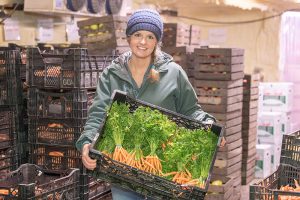Lansing, Mich — The National Institute of Food and Agriculture (NIFA) has awarded Michigan Fitness Foundation (MFF) a Gus Schumacher Nutrition Incentive Program (GusNIP) grant to scale up their successful Michigan Farm to Family: CSA (MF2FCSA) pilot program. GusNIP projects bring stakeholders from distinct parts of the food system together to foster understanding that improves the nutrition and health status of families receiving incentives through the purchase of fruits and vegetables.
 MFF began engaging in food system work through their statewide Supplemental Nutrition Assistance Program Education (SNAP-Ed) programming. Working with community SNAP-Ed grantees, Michigan farmers and community organizations, they came together to collectively understand and remove participation challenges for low-income families in Community Supported Agriculture (CSA) programs. In a typical CSA model, members make a financial investment in advance to buy a “share” of the farm’s production before each growing season. In return, they receive regular distributions of the farm’s bounty throughout the season.
MFF began engaging in food system work through their statewide Supplemental Nutrition Assistance Program Education (SNAP-Ed) programming. Working with community SNAP-Ed grantees, Michigan farmers and community organizations, they came together to collectively understand and remove participation challenges for low-income families in Community Supported Agriculture (CSA) programs. In a typical CSA model, members make a financial investment in advance to buy a “share” of the farm’s production before each growing season. In return, they receive regular distributions of the farm’s bounty throughout the season.
“The cost of a CSA membership can be prohibitive to families with limited resources,” shared MFF Project Manager Jane Whitacre. “Through our program, families pay weekly instead of in advance, are able to use their Supplemental Nutrition Assistance Program (SNAP) benefits to pay for a portion of their membership and pay a significantly reduced price to participate. For example, if a CSA membership cost $20 per box of fresh produce, families would pay $5 using their SNAP benefits and MF2FCSA pays the farm the remaining $15.”
In 2019, MFF tested the MF2FCSA as a pilot program in Wyoming, Michigan through a partnership between MFF, Crisp Country Acres and United Church Outreach Ministry (UCOM).
“The program worked,” said Whitacre. “We look forward to scaling up this program across Michigan. To think that a 15-week MF2FCSA membership means families will receive around 225 pounds of fresh produce for only $75 over the course of the growing season is exciting. By reducing costs and improving access to fresh produce through our program, families facing food insecurity are finally able to afford, purchase, and consume more fresh fruits and vegetables and strengthen their local food systems.”
The GusNIP grant award is $500,000 over four years. With several communities already on board to offer MF2FCSA this spring, MFF’s goal is to scale up the program to 17 communities over the grant term. MFF’s coalition work and network of partners will be leveraged to secure expanded match funding sources to sustain and scale efforts.
For more information about the program and how to get involved, visit https://michiganfitness.org/food/mi-farm-to-family.

